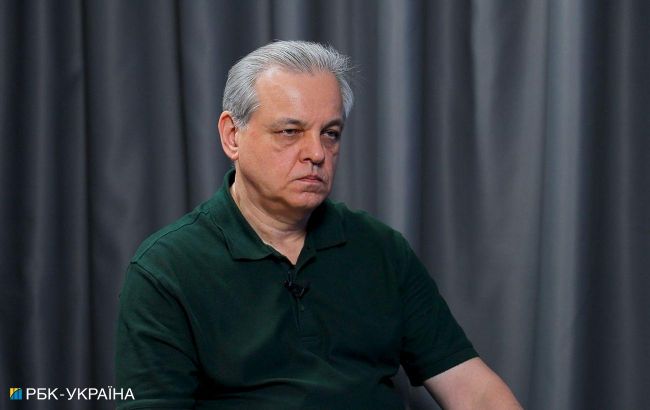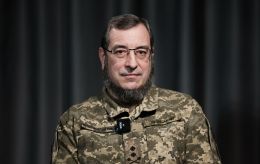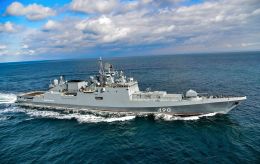Ukrainian member of parliament Serhiy Rakhmanin on borders of 1991: 'This is not a matter of near future'
 Serhiy Rakhmanin (Photo: RBC-Ukraine, Vitalii Nosach)
Serhiy Rakhmanin (Photo: RBC-Ukraine, Vitalii Nosach)
About Ukraine in the early 90s, missed opportunities in the first years of independence, the political realities of past decades, and the true face of Russia and the difficult path to victory – all in an interview with Serhiy Rakhmanin for RBC-Ukraine.
Serhiy Rakhmanin is a member of parliament and a member of the Rada Committee on National Security, Defense, and Intelligence, serving as a People's Deputy of Ukraine. Before entering politics, he worked as a journalist for many years and witnessed the key decisions that have since become history.
On the eve of the 33rd Independence Day, RBC-Ukraine spoke with Rakhmanin about the transformation of Ukrainian society and government over the past three decades, whether the major mistakes of the 90s could have been avoided, the return to the borders of 1991, and what can be considered a victory for us.
“There is a well-known phrase that war is the continuation of politics by other means. This means that war is used as a tool of politics when other options are exhausted. For any politician, even one as insane as Putin, war is always a last resort. If you have the chance and opportunity to solve the issue through other means, you will use those means.
What was [Putin's] task? The task was to make Ukraine fully a zone of his interests. That is a state that is politically and economically completely dependent and controlled by Russia. This could have been a Belarusian scenario, or it could have been another variant, but, generally speaking, Ukraine could have retained the attributes of an independent state but not been sovereign in the full, broad sense of the word. And they always tried to achieve this. Through information means, political, diplomatic, economic means – gas wars, attempts to buy with credits, the Russian cultural society, aggressive informational policy towards Ukraine, bribery, influence, lobbying,” Serhiy Rakhmanin explains.
He says that at first, even Zelenskyy was seen in the Kremlin as a proponent of the "Russian world." But when they realized that he too would not agree to Putin's terms, and when they felt their own military strength, they decided to attack Ukraine.
.jpg)
Serhiy Rakhmanin (Photo: RBC-Ukraine, Vitalii Nosach)
“They did not adequately assess the state of affairs in Ukraine,” Rakhmanin continues. “To defeat the enemy in a war like the one happening now, you not only need to have the necessary capabilities, but you also need three elements that are crucial for victory in a war. These are the ability of the Armed Forces to withstand, the consolidation of the people, and the effectiveness of the management system. If at least one of these three elements falters, you have an advantage. If two, then you have practically won. If all three are in place – meaning the system collapses, the people are not consolidated, and the armed forces do not resist or offer weak resistance – you will win.”
However, Russia miscalculated all three elements. Although Ukraine's political leadership initially made certain mistakes, the population panicked, and the armed forces were disorganized, all three elements held up. “And this became the basis of our non-defeat. We are not yet talking about victory, but the non-defeat in 2022, although everyone predicted defeat for us. Including, let's be honest, many within Ukraine itself,” the deputy explains.
At the same time, Rakhmanin advises Ukrainians to look at things soberly. “If we talk about the borders of 1991, this is not a matter of the near future. In the current conditions of such intense fighting, such circumstances, including those that do not depend on us: look at what is happening in the European Union, Germany, and the United States. In the next year, we will not reach the borders of 1991, right? We will not. Let's not look further ahead, but I think that even in two years, we will not reach the borders of 1991. Our risks of territorial losses in the near and foreseeable future are much greater than the prospects of increasing liberated territories. So should this be set as [a goal]? Is it achievable? Yes. But it is achievable depending on the circumstances.”
_1.jpg)
But the main element of Ukraine's victory, the MP is convinced, is not reaching certain borders but eliminating the existential threat from Russia. And this is impossible without changes within Russia itself, which are not something to rely on for now.
“For us, it is indeed important that we have proven – and this is the victory we have already achieved – we have finally proven to the whole world our right to viability. We have already passed this test of self-sufficiency. This means our chances of achieving a full victory are real and very difficult, depending on many factors and circumstances. But if it weren’t for what happened in 2022, 2023, and also in 2024, it would be much harder to talk about this. Now we can talk about it.”


